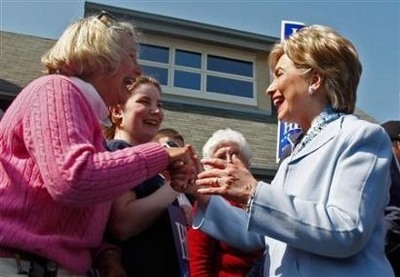Clinton's donations surge after Pennsylvania win
(Agencies)
Updated: 2008-04-24 09:02
Updated: 2008-04-24 09:02
WASHINGTON -- Hillary Rodham Clinton parlayed her campaign-saving primary victory into a fundraising bonanza Wednesday in the Democratic presidential race. Rival Barack Obama, his delegate lead intact, said, "We just keep on plugging away."
One day after Clinton's comfortable win in Pennsylvania, she and Obama looked ahead to contests on May 6 in Indiana and North Carolina and offered sharply contrasting assessments of the race to date.
|
|
"The big win that I had, the broad base of coalition that I put together, is exactly what we're going to need to have in the fall," the former first lady said, arguing that her Pennsylvania victory showed she was more electable than her rival. "And in fact that's what I've done, in big states, in swing states," since the campaign began, she told CBS.
Obama disputed that, saying he had defeated Clinton in primaries or caucuses in several general election battleground states and would "have a much better chance of winning" them in the fall. He mentioned Virginia, Colorado, Wisconsin and Iowa.
He also countered Clinton's suggestions that he's not tough enough to shoulder the presidency. "You know, I've always believed that if you're tough, you don't have to talk about it," he said.
With her win, Clinton made only a modest dent in Obama's overall delegate lead, and she has virtually no prospect of overtaking him before the primary season ends on June 3. Instead, she hopes to convince party leaders who will attend the national convention as superdelegates that she is better able to defeat Republican John McCain in November, and persuade them to swing behind her candidacy as a result.
With a handful of Pennsylvania delegates yet to be awarded, Obama had 1,723.5 and Clinton had 1,592.5 in The Associated Press nationwide count. It takes 2,025 to clinch the nomination.
Clinton said donors had contributed more than $3 million to her candidacy in the hours since her Pennsylvania victory, some of it from thousands of new donors. Her campaign said she was on track for raising $10 million in the first 24 hours after her victory.
Financial reports on file with the Federal Election Commission underscored her need. Obama showed more than $40 million in cash on hand as of April 1, while her debts of $10 million exceeded her cash of just over $9 million.
McCain sought to strengthen his credentials as an unconventional Republican, campaigning in a poor region of Kentucky following stops earlier in the week in Selma, Ala., site of a historic civil rights march, and Youngstown, Ohio, a down-at-the-mouth steel city.
He spent part of Wednesday in an intramural dispute, unsuccessfully urging the North Carolina Republican Party not to air a commercial that shows Obama's former minister, Rev. Jeremiah Wright, denouncing the United States from the pulpit.
The commercial says both Democratic candidates in the state gubernatorial primary support Obama, whom it labels "just too extreme for North Carolina."
"The television advertisement you are planning to air degrades our civics and distracts us from the very real differences we have with the Democrats," McCain wrote Linda Daves, North Carolina party chairwoman. "In the strongest terms, I implore you to not run this advertisement."
Daves turned the request aside, saying, "It is entirely appropriate for voters to evaluate candidates based on their past associations."
Clinton and Obama each netted one superdelegate during the day.
Rep. John Tanner of Tennessee announced his support for the former first lady, and Oklahoma Gov. Brad Henry endorsed her rival.
Both candidates campaigned in Indiana during the day, a state that looks far more competitive than North Carolina, where a large black population gives Obama an advantage.
In New Albany, Ind., Obama was asked why he thought he could win Indiana when he lost Pennsylvania and Ohio, two states with large numbers of blue-collar workers.
"People are a little more familiar with me here," he said of a state that shares a border and a northern television market with Illinois.
He also turned back questions about his toughness.
"Nobody has complained more about the press, about questions at debates, about being mistreated as Sen. Clinton has or President Clinton has," he said. "We have been pretty tame in terms of taking our shots and just rolling with them."
Clinton was in Indianapolis, where she pledged to focus on economic issues. "This campaign for me here in Indiana is about jobs, jobs, jobs and jobs," she said. She promised to make investments in manufacturing and to end tax breaks for companies that ship jobs overseas.
A new dispute broke out in a campaign filled with them, this one involving vote counts.
Clinton said she had "received more votes by the people who have voted, than anybody else." Her reckoning included Florida and Michigan, states that held primaries so early in the year that the Democratic National Committee said they did not count, and denied seating to delegates.
Obama leads in the combined vote totals in primaries and caucuses that have counted, and he dismissed Clinton's claim.
"There have been a number of different formulations that the Clinton camp has been trying to arrive at to suggest that somehow they're not behind," he said.
|
||
|
||
|
|
|
|
